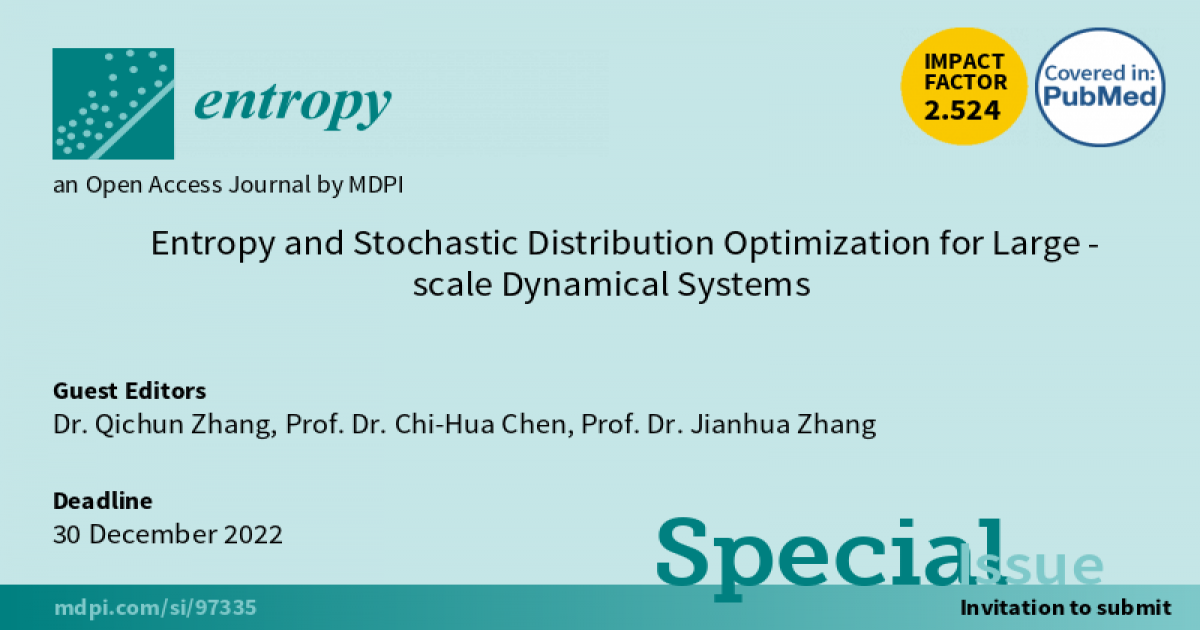Entropy and Stochastic Distribution Optimization for Large-Scale Dynamical Systems
A special issue of Entropy (ISSN 1099-4300). This special issue belongs to the section "Multidisciplinary Applications".
Deadline for manuscript submissions: closed (30 December 2022) | Viewed by 10098

Special Issue Editors
Interests: stochastic systems; control systems; non-gaussian systems; entropy optimisation; stochastic distribution control; probabilistic decoupling; performance enhancement; non-gaussian filtering; data-driven design and optimisation; computational neuroscience; brain-computer interface
Special Issues, Collections and Topics in MDPI journals
Interests: healthcare systems; augmented reality; big data; deep learning; internet of things; data mining
Special Issues, Collections and Topics in MDPI journals
Interests: energy conversion and control; artificial intelligence and machine learning; modelling and control of complex industrial processes; networked control systems; fault diagnosis and fault-tolerant control
Special Issues, Collections and Topics in MDPI journals
Special Issue Information
Dear colleagues,
With the development of artificial intelligence and Internet of Things technologies, the engineering system becomes more and more complex with strong nonlinear dynamics. Since the uncertainness and randomness of the complex systems affect the prediction of traditional model-based designs, the optimization problem has been defined using entropy and stochastic distribution. Based on the recent literature, it has been shown that entropy and stochastic distribution can be considered a design tool for large-scale engineering systems in terms of performance enhancement. Therefore, this Special Issue focuses on this topic to investigate fundamental and applicable results in order to attenuate systemic randomness.
Motivated by this fundamental research topic, the potential applications can be extended using entropy and stochastic distribution, such as the industrial process, transportation system, energy system, manufacturing, networked system, etc. Based upon the developed new results, more practical applications will generate impact on knowledge transfer.
This topics of interest of this Special Issue include but are not limited to the following research area:
- Machine-learning-based system design, fault diagnosis, tolerant control;
- Data-driven filtering and monitoring for stochastic dynamic systems;
- Stochastic distribution generation via dynamical data sets;
- Entropy optimization and modeling for performance enhancement;
- Nonlinear system control with randomness attenuation;
- Entropy-based image, signal processing and classification;
- Decision-making, management, and planning for stochastic systems;
- Mathematical extensions for entropy analysis.
Dr. Qichun Zhang
Prof. Dr. Chi-Hua Chen
Prof. Dr. Jianhua Zhang
Guest Editors
Manuscript Submission Information
Manuscripts should be submitted online at www.mdpi.com by registering and logging in to this website. Once you are registered, click here to go to the submission form. Manuscripts can be submitted until the deadline. All submissions that pass pre-check are peer-reviewed. Accepted papers will be published continuously in the journal (as soon as accepted) and will be listed together on the special issue website. Research articles, review articles as well as short communications are invited. For planned papers, a title and short abstract (about 100 words) can be sent to the Editorial Office for announcement on this website.
Submitted manuscripts should not have been published previously, nor be under consideration for publication elsewhere (except conference proceedings papers). All manuscripts are thoroughly refereed through a single-blind peer-review process. A guide for authors and other relevant information for submission of manuscripts is available on the Instructions for Authors page. Entropy is an international peer-reviewed open access monthly journal published by MDPI.
Please visit the Instructions for Authors page before submitting a manuscript. The Article Processing Charge (APC) for publication in this open access journal is 2600 CHF (Swiss Francs). Submitted papers should be well formatted and use good English. Authors may use MDPI's English editing service prior to publication or during author revisions.
Keywords
- entropy dynamic optimization
- stochastic distribution optimization
- minimum entropy filtering
- data-driven entropy modeling and control
- randomness attenuation for complex dynamic systems








